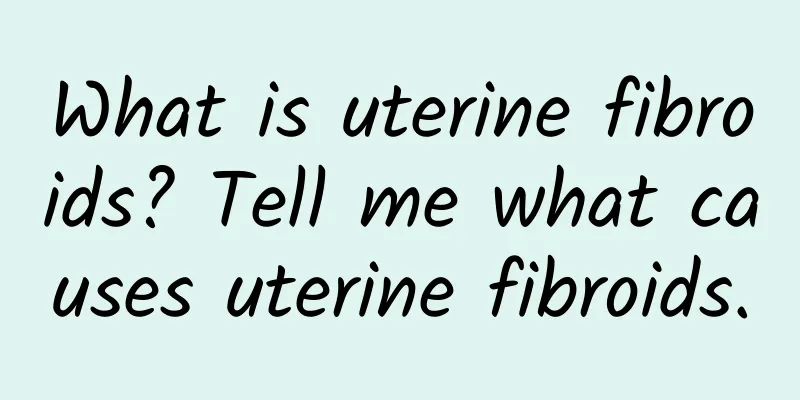What is uterine fibroids? Tell me what causes uterine fibroids.

|
What is uterine fibroids? Tell me what causes uterine fibroids. Uterine fibroids are a common benign gynecological tumor that grows mainly on the inner wall of the uterus. They are composed of smooth muscle cells, and usually multiple fibroids are distributed in the uterus in different sizes and shapes. The disease is not malignant, and most patients do not have obvious symptoms, but sometimes it can cause some discomfort to women. What are uterine fibroids Uterine fibroids are masses formed by the continuous growth of muscle cells in the myometrium of the uterus. These muscle cells can form a single or multiple fibroids and may grow in different locations in the uterus. The size and number of uterine fibroids vary from person to person. The nodules can be small enough to be observed only under a microscope or large enough to occupy the entire uterine cavity. Main causes At present, the cause of uterine fibroids is not fully understood. However, studies have shown that estrogen and genetic factors may be related to the occurrence of uterine fibroids. 1. Estrogen levels Estrogen plays a vital role in women's bodies, but excess estrogen may also lead to the development of uterine fibroids. High estrogen levels may stimulate the growth of muscle cells in the myometrium, which can trigger the formation of fibroids. 2. Genetic factors Family history is an important factor in the development of uterine fibroids. If someone else in the family has uterine fibroids, the individual's risk of the disease will also increase. There may be some association between genetic mutations and the occurrence of uterine fibroids, but the specific genetic mechanism has not yet been fully elucidated. Symptoms and manifestations In most cases, uterine fibroids do not cause obvious symptoms and discomfort, so many women do not know they have the disease. However, some patients may experience some of the following symptoms and manifestations: 1. Abnormal menstruation Uterine fibroids may cause changes in the menstrual cycle, such as heavy, prolonged, or irregular periods. This is because the fibroids press on the uterine cavity, blocking the normal menstrual flow. 2. Abdominal pain and pelvic discomfort Larger uterine fibroids may cause abdominal pain and pelvic discomfort. This discomfort may be caused by the enlargement of the uterus and the pressure on surrounding tissues. 3. Compression-related symptoms The location and size of the fibroid may cause other compression-related symptoms. For example, when the fibroid is next to the bladder, it may cause frequent and urgent urination, and when the fibroid presses on the rectum, it may cause constipation and rectal pressure. Treatment Treatment is usually not needed for women before pregnancy, and for women in menopause and postmenopause, because fibroids shrink on their own during this period. However, treatment may be necessary for patients with severe symptoms or who have difficulty in fertility plans. Specific treatment methods include medication, surgery, and interventional therapy. Uterine fibroids are a common gynecological disease, and the cause of the disease is not fully understood. Some factors such as high estrogen levels and family inheritance may be related to the onset of uterine fibroids. Although most patients have no obvious symptoms and discomfort, some patients may experience symptoms such as menstrual abnormalities, abdominal pain, and pelvic discomfort. For patients who need treatment, doctors can choose appropriate treatment methods based on their condition. |
>>: What are uterine fibroids? What are the causes of uterine fibroids?
Recommend
What are the clinical manifestations of cervicitis?
Cervicitis is a common gynecological disease, and...
Dry noodles vs. soup noodles, which one has the highest calories? The fattening killer of pasta is…
Eating noodles can easily make people feel good. ...
What are the different types of vaginitis?
There is not just one type of vaginitis. There ar...
I have bloody leucorrhea after my period, but it is normal before my period. What's wrong?
I have bloody leucorrhea after my period, but it ...
What are the early symptoms of ovarian cysts?
What are the early symptoms of ovarian cysts? Exp...
Will long-term sitting cause cervical erosion? What should you pay attention to in order to prevent cervical erosion?
In modern society, more and more white-collar wom...
What should I do if I always have headaches during menstruation?
What should I do if I always have headaches durin...
What should women do if they have uterine fibroids? What are the symptoms of uterine fibroids in women?
Understanding the symptoms of female uterine fibr...
Survey: The obesity rate among children exceeds 30%! Nutritionists urge: Reduce eating out, 3 tips to prevent childhood obesity
According to the latest National Nutrition Survey...
Causes of ovarian cysts in women
Ovarian cysts are a type of gynecological disease...
What fruits and vegetables should I eat for pelvic inflammatory disease?
If you have symptoms of pelvic inflammatory disea...
Does fasting activate the body's self-healing ability? Japanese experts reveal: 5 keys to anti-aging and disease prevention
Many people who want to lose weight often cannot ...
Effective prevention of hyperprolactinemia
What are the effective prevention methods for hyp...
How to prevent premature ovarian failure
How to prevent premature ovarian failure? There a...
What to do if you want to get pregnant after ectopic pregnancy treatment
The symptoms of ectopic pregnancy have now affect...









